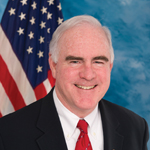
First-termer Rep. Patrick Meehan (R-Pa.) wants changes to the Medicare and Medicaid programs to give nursing home providers more certainty in their expectations for reimbursement levels, noting he gets the challenges facing the long term and post-acute care sectors at a time of restrained federal and state spending.
Meehan, in an interview with Provider, says he keeps long term care as a priority issue not only because of its importance to the nation, but also because his 7th congressional district outside of Philadelphia is home to many seniors. In fact, he says, Pennsylvania ranks third in the country for population of seniors and fourth for the number of residents 85 and older.
“Ensuring the best care for our seniors is a top priority of mine,” Meehan says.
To give providers some assistance in their business planning, he wants to start solving the quandary of how to maintain the Medicare and Medicaid programs by ending the way reimbursement is calculated.
“Medicare and Medicaid providers have been facing high uncertainty in providing care, often not knowing what level of reimbursement they may receive. I believe one way to better manage these programs is to provide certainty. We see the need for certainty with the need to permanently repeal the Sustainable Growth Rate formula that is used to calculate physician reimbursements for Medicare. Congress has no intention of allowing a 30 percent or 40 percent cut in reimbursement for services, and we should not continue to kick the can down the road with short-term patches, pretending that this may actually be the case,” Meehan says.
Moving forward, he thinks it is important to recognize that nursing facilities, hospitals, and other providers are sharing a significant burden in the effort to curb deficit spending. Meehan wants to pursue savings and reforms, but not at the cost of care.
“Congress needs to better understand the shoestring on which many hospitals and nursing facilities operate to ensure we are not putting seniors’ health care and quality of life in jeopardy. This is an issue I’ve been working closely on since coming to Congress last year, and I will remain committed to it,” Meehan says.
For Medicaid, Meehan echoes what many Republicans in Congress want, which is to give the states a larger role in administering and providing access for their beneficiaries. “I believe each state should have the ability to reform their Medicaid program to better serve their patient population,” he says.
Also in line with most from his party, Meehan does not agree with the part of President Obama’s health care plan that created the Independent Payment Advisory Board (IPAB), which will be charged with finding savings in Medicaid. He said it is actually a bipartisan issue concerning lawmakers from both parties on how much control the IPAB will have.
“Composed of unaccountable bureaucrats, it will make arbitrary decisions about what is covered and not based on the bottom line and not what contributes to quality of care for seniors, either in hospitals, doctors’ offices, or nursing facilities,” Meehan says.
Meehan said he supported HR 674, which repealed the 3 percent withholding requirement that would have allowed Medicare to withhold 3 percent of all payments to federal government contractors.
“While 3 percent may not sound like a significant amount, without repeal, this delayed reimbursement could have jeopardized vital services for seniors and people with disabilities at long term care facilities,” he says.
His broader view of the health care system reflects his feeling Obama’s health care law missed a chance to help lower skyrocketing costs, noting the reforms will actually boost costs by $311 billion over the next decade. “Instead, we need to take costs out of the system. One way to do that is through small business health plans, which will help bring down health care costs. Many individual small businesses want to provide health benefits to their employees, but find them too expensive to purchase on their own,” Meehan says.
“By passing a law to allow small business health plans to form, many individual businesses can join together and pool their risk, allowing them to get the same good deals that big corporations get.”
His duties on Capitol Hill include membership on the House Oversight and Government Reform, Transportation and Infrastructure, and Homeland Security committees. He is also chairman of the Homeland Security Subcommittee on Counterterrorism and Intelligence.
“In this role, I’ve had the opportunity to examine the changing nature of the threat to the homeland. On the Oversight Committee, I work on a wide range of issues including how we can make our government leaner, more efficient, and more accountable,” Meehan says.
For the near term, he is focused not only on health care, but on job creation and economic growth and the intersection of these two issues. “With one in six jobs in southeastern Pennsylvania related to the life sciences industry and a high population of seniors, I am making it a priority to work with my colleagues to ensure doctors do not continue to face devastating cuts over and over again.”